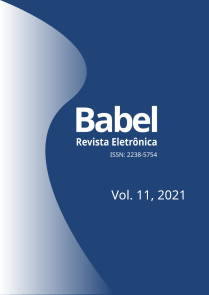What do parents expect from their children's English learning?
Keywords:
English for Children, Parent's Expectations, School-FamilyAbstract
Parents might think about different ways for their children to learn English from an early age because of the current importance of the English Language. Thus, the theme of this research came up: to analyze parents´ expectations about their children’s English learning. To this end, the advantages and disadvantages of teaching English to children are raised by comparing their learning process with the adult’s process and also approaching the playfulness on teaching languages to children’s methodologies. The parents’ role in their children’s education and how this affects the relationship between school and family are discussed as well as parents´ expectations about their children’s education in general. This research was done through a questionnaire with 23 parents with the objective of analyzing the parents´ expectations about their children’s English learning. The questionnaire had some distinct parts. In the first one, the participants were supposed to assign how much they agreed with 13 statements. After that, they had to assign the importance of each skill and element and the frequency with which some activities should happen in their children´s English class. Finally, they answered three questions about the importance of knowing English and reflections about the questionnaire. It can be noticed that these parents consider all skills and elements important, search for different activities besides the textbook, and seem to agree with some of the English as a Lingua Franca postulates.
Downloads
References
ANTONINI, A. F. A cultura de aprender língua estrangeira (inglês) de alunos de 1ª e 4ª séries do ensino fundamental. Dissertação (mestrado). Universidade Estadual de Campinas, Instituto de Estudos da Linguagem, Campinas, 2009. Disponível em: https://feliceuel.files.wordpress.com/2018/09/e-a-cultura-de-aprender-lc3adngua-estrangeira-inglc3aas-de-alunos-de-1c2aa-e-4c2aa-sc3a9ries-do-ensino-fundamental.pdf
BHERING, E.; SIRAJ-BLATCHFORD, I. A relação escola-pais: um modelo de trocas e colaboração. Caderno de Pesquisa, Nº 106, mar, 1999, São Paulo: p. 191-216. Disponível em: https://www.scielo.br/j/cp/a/sYx8xKKNStQtFSBXpnrPDwq/abstract/?lang=pt
BROWN, D. Teaching by Principles: An interactive Approach to Language Pedagogy. New York: Pearson Education, 2007.
CARDOSO, S. H.; SABBATINI, R. M. E. Aprendizagem e mudanças no cérebro. 2006. Disponível em: <http://www.cerebromente.org.br/n11/mente/eisntein/rats-p.html>. Acesso em: 15 de dezembro de 2019.
DAMASCENO, D. P. C. O que a família espera da Escola? O caso das famílias responsáveis por alunos do 1º ao 5º ano do Ensino Fundamental no Município de São João da Barra –RJ. (Belo Horizonte, online) [online]. 2017, vol.2, n.2. ISSN 2526-1126. Disponível em: https://rbeducacaobasica.com.br/o-que-a-familia-espera-da-escola-o-caso-das-familias-responsaveis-por-alunos-do-1o-ao-5o-ano-do-ensino-fundamental-no-municipio-de-sao-joao-da-barra-rj/
DÖRNYEI, Z. Questionnaires in Second Language Research: Construction, Administration, and Processing. Mahwah, N.J.: Lawrence Erlbaum Associates, 2003.
ELLIS, R. Measuring implicit and explicit knowledge of a second language: A psychometric study. Studies in second language acquisition, v. 27, Auckland, University of Auckland, 2005.
ESTEVES, S. H. N. Expectativas e justificativas para o ensino de língua inglesa na educação infantil: uma pesquisa com escola, professora e pais de alunos. 2009. 41 f. Monografia (Especialização em Ensino de Línguas Estrangeiras). UEL - Universidade Estadual de Londrina, Londrina. Disponível em: http://www.uel.br/pessoal/sreis/pages/arquivos/2009_ESTEVES_
Expectativas%20e%20justificativas%20para%20o%20ensino%20de%20lingua
%20inglesa%20na%20educacao%20infantil_Monografia_EELE.pdf
FANG, B. Uma análise da relação família-escola: para além da fala da família. Trabalho de Conclusão de Curso (Graduação). Universidade Presbiteriana Mackenzie, São Paulo, 2018.
FERNANDES, C. Curso de idiomas, escola bilíngue ou internacional? Saiba escolher bem. Disponível em: <https://www.metropoles.com/colunas-blogs/e-ducacao/curso-de-idiomas-escola-bilingue-ou-internacional-saiba-escolher-bem>. Acesso em: 23 de outubro de 2019.
GILMOUR, S. Five essential tips for teaching very young children English. Voices Magazine, British Council, 2016. Disponível em: https://www.britishcouncil.org/voices-magazine/five-essential-tips-teaching-very-young-children-english
KRASHEN, S. D. Second Language Acquisition and Second Language Learning. University of Southern California. Pergamon Press Inc, 1981.
LIGHTBOWN, P. M.; SPADA, N. How languages are learned. Oxford: University Press, 4th edition, 2013.
OLIVEIRA, A. T.; SÁ, I. R.; SANTOS, F. N.; SOARES, F. M. G. C. As expectativas da família para com a escola: uma análise a partir dos depoimentos de pais e responsáveis pelas crianças estudantes de duas escolas públicas de Mossoró - RN. Resumo de comunicação livre: 64ª reunião anual da SBPC, 2012. Disponível em: http://www.sbpcnet.org.br/livro/64ra/resumos/resumos/6947.htm
PEREIRA, A. C. S.; PERES, M. R. A criança e a língua estrangeira: contribuições psicopedagógicas para o processo de ensino e aprendizagem. Constr. psicopedag. [online], vol 19 Nº 18, 2011, p. 38-64. Disponível em: http://pepsic.bvsalud.org/scielo.php?script=sci_arttext&pid=S1415-69542011000100006
QUEENSLAND State. Why play is important. Early Childhood Education Care, 2015.
ROZEMBERG, E. Os fatores mais procurados pelos pais na hora da matrícula. Plataforma Educacional [online], blog Gestão Escolar, 2018. Disponível em: https://www.somospar.com.br/7-criterios-que-os-pais-analisam-para-definir-matricula-escolar/
SARAIVA, L. A.; WAGNER, A. A Relação Família-Escola sob a ótica de Professores e Pais de crianças que frequentam o Ensino Fundamental. Ensaio: Avaliação e Políticas Públicas, vol 21 Nº 81, out-dez, 2013, Rio de Janeiro: p. 739-772. Disponível em: https://www.scielo.br/j/ensaio/a/mQHVP55HKZghCGcrrqv9qzC/abstract/?lang=pt
UR, P. A course in English language teaching. Cambridge: CUP, 2012.
VILLARROEL, D. How young children learn English through play. Voices Magazine, British Council, 2015. Disponível em: https://www.britishcouncil.org/voices-magazine/how-young-children-learn-english-through-play
VILKEVICIUS, B. D. S. A formação para a docência de língua inglesa no ensino fundamental I: constatação na prática. Trabalho de Conclusão de Curso. Curso de Licenciatura em Letras Português-Inglês, Universidade Tecnológica Federal do Paraná, 2018.
Published
How to Cite
Issue
Section
License
Os autores detém os direitos autorais sem restrições, porém ao submeter os originais, concordam em transferir a este periódico os direitos da primeira publicação. Isto deve ser informado em caso de nova edição do texto. As produções que derivarem deste material, devem obrigatoriamente citar a fonte. Os textos publicados nesta revista, salvo indicações contrárias, encontram-se sob uma licença Creative Commons Atribuição 4.0 Internacional.

